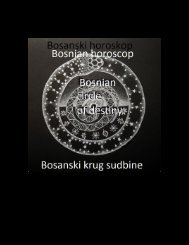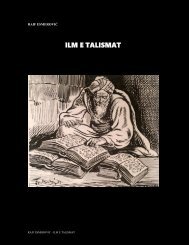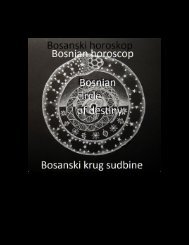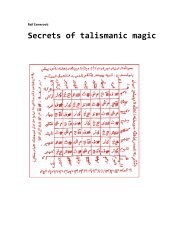Cult of fertility among the Bosnian People
In order to write credibly and in detail about the cult of fertility of the Bosnian people, it is necessary to start from the beginning which goes back to the ancient times and speaks about our famous forefathers the Illyrians, and one of their most important deities - snake. Namely, Illyrian cult of the snake as a primary symbol of fertility in folk religion of the Bosnian people, is not only noticeable in the belief about the home snake - protector of the family, i.e. totem of the head of the family, usually a male, i.e. father, but also her sacred meaning. The snake cult, on which the genesis of the grandfather of our forefathers is based on, has an even wider meaning and significance.
In order to write credibly and in detail about the cult of fertility of the Bosnian people, it is necessary to start from the beginning which goes back to the ancient times and speaks about our famous forefathers the Illyrians, and one of their most important deities - snake. Namely, Illyrian cult of the snake as a primary symbol of fertility in folk religion of the Bosnian people, is not only noticeable in the belief about the home snake - protector of the family, i.e. totem of the head of the family, usually a male, i.e. father, but also her sacred meaning. The snake cult, on which the genesis of the grandfather of our forefathers is based on, has an even wider meaning and significance.
- TAGS
- raif-esmerovic
Create successful ePaper yourself
Turn your PDF publications into a flip-book with our unique Google optimized e-Paper software.
Great Mo<strong>the</strong>r, <strong>of</strong>ten times depicted<br />
on reliefs and monuments alongside<br />
god Vidasus. Wheat plays a<br />
pronounced role in <strong>the</strong> cult <strong>of</strong><br />
<strong>fertility</strong> and <strong>the</strong> act <strong>of</strong> <strong>of</strong>fering<br />
<strong>of</strong> wheat to <strong>the</strong> goddess has <strong>the</strong><br />
goal <strong>of</strong> securing her grace and<br />
successful harvest. Dominant<br />
symbol <strong>of</strong> <strong>the</strong> one that gives life,<br />
first deity in human history, for<br />
<strong>the</strong> Illyrians wheat represented<br />
<strong>the</strong> biggest sanctity but also<br />
ancient sin.<br />
Illyrian legends<br />
Mythological involvement <strong>of</strong> <strong>the</strong><br />
snake in <strong>the</strong> cult <strong>of</strong> <strong>fertility</strong> is<br />
evident through ancient Illyrian<br />
legends, with whose analysis we<br />
can discern in greater detail <strong>the</strong><br />
connection <strong>of</strong> <strong>the</strong> snake with o<strong>the</strong>r<br />
elements <strong>of</strong> this cult, especially<br />
wheat. In <strong>the</strong> book "Ancient<br />
pledged monuments on <strong>the</strong> locality<br />
<strong>of</strong> BiH" (1977), author Enver<br />
Imamović mentions an interesting<br />
piece <strong>of</strong> information about <strong>the</strong><br />
connection <strong>of</strong> wheat and a female<br />
deity: "For example, in Herodotus<br />
we find data about a female deity<br />
<strong>among</strong> Paionians which are<br />
identified with <strong>the</strong> Greek<br />
Artemisia. Illyrian women<br />
sacrifice wheat straw to her".<br />
Artemisia is known as <strong>the</strong> goddess<br />
<strong>of</strong> hunting, nature and animals,<br />
all things that Illyrians ascribed<br />
to <strong>the</strong> goddess Tana. With this<br />
data we are closer to <strong>the</strong><br />
conclusion that Tana is behind <strong>the</strong><br />
Raif Esmerović<br />
During <strong>the</strong> time <strong>of</strong> <strong>the</strong> Roman's i.e.<br />
Roman occupation <strong>the</strong>re was a<br />
fa<strong>the</strong>r with seven sons and one<br />
daughter in Illirika. At one<br />
opportunity <strong>the</strong> sons out <strong>of</strong><br />
boredom and wanton took <strong>the</strong> bread<br />
out <strong>of</strong> <strong>the</strong> house, placed it on a<br />
larger stone and used it for<br />
target practice with spears. The<br />
fa<strong>the</strong>r was unaware <strong>of</strong> <strong>the</strong>ir<br />
actions, but hearing <strong>the</strong>ir<br />
laughter he decided to see what<br />
was going on. At <strong>the</strong> same time,<br />
while <strong>the</strong> fa<strong>the</strong>r was exiting <strong>the</strong><br />
house, <strong>the</strong> spear <strong>of</strong> one <strong>of</strong> <strong>the</strong><br />
sons hit <strong>the</strong> bread, and to<br />
everyone's surprise, blood started<br />
to flow out <strong>of</strong> it. Seeing this <strong>the</strong><br />
fa<strong>the</strong>r yelled at his boys, asking<br />
what <strong>the</strong>y have done, because now<br />
<strong>the</strong>y caused <strong>the</strong> wrath <strong>of</strong> gods,<br />
which will punish <strong>the</strong>m surely.<br />
Punishment is ruthless since god's<br />
sentence sons to banishment and<br />
<strong>the</strong>y have to leave <strong>the</strong> home,<br />
parting on all four sides <strong>of</strong> <strong>the</strong><br />
globe, and <strong>the</strong> only ones left are<br />
<strong>the</strong> fa<strong>the</strong>r and his daughter. Soon<br />
<strong>the</strong> fa<strong>the</strong>r died out <strong>of</strong> great<br />
sorrow for his sons. The girl wept<br />
and mourned since she was <strong>the</strong> only<br />
one left in <strong>the</strong> house. The god's<br />
decided to turn her into a huge<br />
<strong>Cult</strong> <strong>of</strong> <strong>fertility</strong> <strong>among</strong> <strong>the</strong> <strong>Bosnian</strong> <strong>People</strong>

















